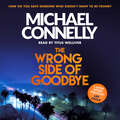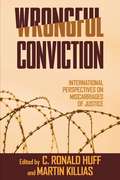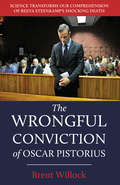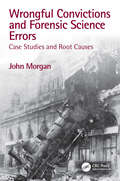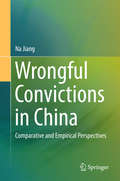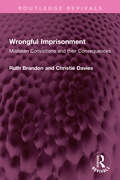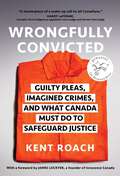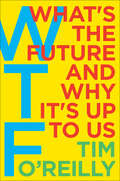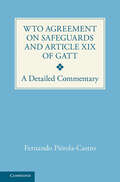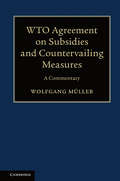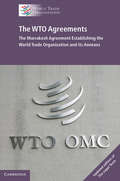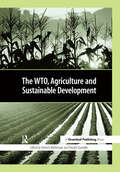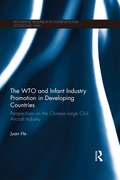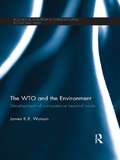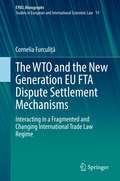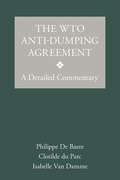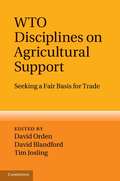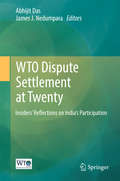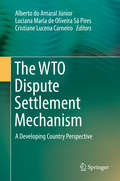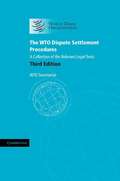- Table View
- List View
The Wrong Side of Goodbye (Harry Bosch Series #19)
by Michael ConnellyOnly Harry Bosch can uncover LA's darkest secrets in this new gripping thriller from global bestseller Michael Connelly. Read by Titus Welliver, star of BOSCH.'What do you want me to do?' Bosch asked again.'I want you to find someone for me,' Vance said. 'Someone who might not have ever existed.'Harry Bosch is working as a part-time detective in the town of San Fernando outside of Los Angeles, when he gets the invitation to meet with the ageing aviation billionaire Whitney Vance. When he was eighteen Vance had a relationship with a Mexican girl called Vibiana Duarte, but soon after becoming pregnant she disappeared.Now, as he reaches the end of his life, Vance wants to know what happened to Vibiana and whether there is an heir to his vast fortune. And Bosch is the only person he trusts to undertake the assignment.Harry's aware that with such sums of money involved, this could be a dangerous undertaking - not just for himself, but for the person he's looking for - but as he begins to uncover Vibiana's tragic story, and finds uncanny links to his own past, he knows he cannot rest until he finds the truth.(p) 2016 Hachette Audio
Wrongful Conviction: International Perspectives on Miscarriages of Justice
by Martin Killias C. Ronald HuffImperfections in the criminal justice system have long intrigued the general public and worried scholars and legal practitioners. InWrongful Conviction, criminologists C. Ronald Huff and Martin Killias present an important collection of essays that analyzes cases of injustice across an array of legal systems, with contributors from North America, Europe and Israel. Using this cross-national perspective, the volume offers detailed discussions of specific legal systems while also considering issues that transcend national boundaries. Differences in court procedures are explained as contributors ask what role the respective criminal justice systems play in preventing or generating wrongful convictions. Most importantly, this collection includes a number of well-developed public-policy recommendations intended to reduce the instances of courts punishing innocents. It also offers suggestions for compensating more fairly those who are wrongfully convicted.
The Wrongful Conviction of Oscar Pistorius: Science Transforms our Comprehension of Reeva Steenkamp’s Shocking Death
by Brent WillockJust when the world thought Oscar Pistorius’ meteoric rise to Olympic glory and international celebrity had terminated abysmally in prison, Brent Willock’s scientific perspective reopens this gripping narrative for an astonishing re-view.Olympian Oscar Pistorius’ spectacular assent to fame ground to a screeching halt in the wee hours of Valentine’s Day, 2013. Hearing a sound emanating from his bathroom, he grabbed his pistol and he stumbled to the washroom, screaming at the intruders to leave. Fearing someone was about to emerge to harm him and his girlfriend, Reeva, he fired four bullets into the bathroom. Soon he realized he had killed his lover. Horrified, he summoned the authorities. The investigating detective believed this was yet another case of an escalating argument where a man murdered his partner. World opinion is split. Some believe Oscar. Others are convinced he committed a despicable crime of passion.Distinguished clinical psychologist Brent Willock brings an entirely new perspective to bear on these horrific events: that Oscar’s horrific actions occurred while he was in a state of paradoxical sleep, also known as parasomnia. Throughout this book, Willock uses scientific scrutiny and legal precedence to resolve the crucial anomalies surrounding the Oscar Pistorius trial. Willock also discusses how mental health experts and the defense team might have overlooked the hypothesis of parasomnia that could have exonerated Oscar.Millions who followed the Blade Runner’s astonishing achievements, uplifted and inspired by his triumph over physical adversity, were crushed by his precipitous plunge from grace. They were baffled. Even Oscar himself, in a television interview shortly before his sentencing, achingly asked, “I always think, How did this possibly happen? How could this have happened?” At last, Willock’s elegant work responds to these poignant questions that have so plagued and pained Reeva’s family, friends, Oscar, and, indeed, the world.
Wrongful Convictions and Forensic Science Errors: Case Studies and Root Causes
by John MorganForensic Science Errors and Wrongful Convictions: Case Studies and Root Causes provides a rigorous and detailed examination of two key issues: the continuing problem of wrongful convictions and the role of forensic science in these miscarriages of justice. This comprehensive textbook covers the full breadth of the topic. It looks at each type of evidence, historical factors, system issues, organizational factors, and individual examiners. Forensic science errors may arise at any time from crime scene to courtroom. Probative evidence may be overlooked at the scene of a crime, or the chain of custody may be compromised. Police investigators may misuse or ignore forensic evidence. A poorly-trained examiner may not apply the accepted standards of the discipline or may make unsound interpretations that exceed the limits of generally accepted scientific knowledge. In the courtroom, the forensic scientist may testify outside the standards of the discipline or fail to present exculpatory results. Prosecutors may suppress or mischaracterize evidence, and judges may admit testimony that does not conform to rules of evidence. All too often, the accused will not be afforded an adequate defense—especially given the technical complexities of forensic evidence. These issues do not arise in a vacuum; they result from system issues that are discernable and can be ameliorated. Author John Morgan provides a thorough discussion of the policy, practice, and technical aspects of forensic science errors from a root-cause, scientific analysis perspective. Readers will learn to analyze common issues across cases and jurisdictions, perform basic root cause analysis, and develop systemic reforms. The reader is encouraged to assess cases and issues without regard to preconceived views or prejudicial language. As such, the book reinforces the need to obtain a clear understanding of errors to properly develop a set of effective scientific, procedural, and policy reforms to reduce wrongful convictions and improve forensic integrity and reliability. Written in a format and style accessible to a broad audience, Forensic Science Errors and Wrongful Convictions presents a thorough analysis across all of these issues, supported by detailed case studies and a clear understanding of the scientific basis of the forensic disciplines.
Wrongful Convictions in China
by Na JiangThe primary focus of this comparative and empirical work is to address wrongful convictions between China and common-law countries in order to promote a better understanding of wrongful convictions in China's practice with the help of comparative analyses, verifiable and empirical data and case studies. It examines the scope of wrongful convictions and offers new insights into the worldwide movement to prevent them, assesses how far it has progressed and what reforms are most needed. The book suggests that adversarial and inquisitorial systems alike could benefit from this research and learn valuable lessons from one another on how to effectively reduce the risk of wrongful convictions.
Wrongful Death
by Baine KerrA man crushed between locomotives at a Wyoming switching yard... the mass murder of patients in a hospital in the former Yugoslavia. . . the wrongful death of a comatose woman. As attorney Elliot Stone starts piecing together a three-part Chinese puzzle, one question echoes through it all: How can the good do evil?
Wrongful Imprisonment: Mistaken Convictions and their Consequences (Routledge Revivals)
by Ruth Brandon Christie DaviesFirst published in 1973, Wrongful Imprisonment aims to combine the human interest of individual cases of wrongful imprisonment with a general analysis of how and why they occur. It deals in detail with the English system, but also provides comparisons with Scotland, France, and the United States. The authors spent three years collecting material from newspaper reports, trial transcripts, books, lawyers, the Home Office and – most important – interviews with the persons concerned. As a result, they have been able to analyse objectively the existing system of justice; they have isolated and identified the areas in which the system is at fault, and the successive hazards which may confront the innocent man suspected of a criminal offence; they have also revealed the many obstacles which have to be overcome by the wrongfully imprisoned man seeking to establish his innocence and regain his liberty. This topical and convincingly argued book should appeal not only to students of law and sociology, or to lawyers, policemen, criminals, and others involved in the system of criminal justice, but also to the man in the Wormwood Scrubs omnibus.
Wrongfully Convicted: Guilty Pleas, Imagined Crimes, and What Canada Must Do to Safeguard Justice
by Kent RoachA top legal scholar explains Canada&’s national tragedy of wrongful convictions, how anyone could be caught up in them, and what we can do to safeguard justice.Canada&’s legal system has a serious problem: a significant but unknown number of people have been convicted for crimes they didn&’t commit. There are famous cases of wrongful convictions, such as David Milgaard and Donald Marshall Jr., where the system convicted the wrong person for murder. But there are lesser-known cases: people who feel they have no option but to plead guilty, and people convicted of crimes that were imagined by experts or the police that never, in fact, happened. Kent Roach, cofounder of the Canadian Registry of Wrongful Convictions, award-winning author, and law professor, has dedicated his illustrious career to documenting flaws in our justice system. His work reveals that the burden of wrongful convictions falls disproportionately on the disadvantaged, including Indigenous and racialized people, those with cognitive issues, single mothers, and the poor. Wrongfully Convicted raises awareness about wrongful convictions at a time when DNA exonerations are less frequent and the memories of most famous wrongful convictions are fading. Roach makes a compelling case for change that governments have so far lacked the courage to make. They include better legislative regulation of police and forensic experts and the creation of a permanent and independent federal commission both to investigate wrongful convictions and their multiple causes. Roach&’s research and vast knowledge point to systemic failings in our legal system. But he also outlines vital changes that can better prevent and correct wrongful convictions. Until we do, many of the wrongfully convicted are still waiting for the promise of justice. It is an issue that affects all Canadians.
WTF?: What's the Future and Why It's Up to Us
by Tim O'ReillyWTF? can be an expression of amazement or an expression of dismay. In today’s economy, we have far too much dismay along with our amazement, and technology bears some of the blame. In this combination of memoir, business strategy guide, and call to action, Tim O'Reilly, Silicon Valley’s leading intellectual and the founder of O’Reilly Media, explores the upside and the potential downsides of today's WTF? technologies. What is the future when an increasing number of jobs can be performed by intelligent machines instead of people, or done only by people in partnership with those machines? What happens to our consumer based societies—to workers and to the companies that depend on their purchasing power? Is income inequality and unemployment an inevitable consequence of technological advancement, or are there paths to a better future? What will happen to business when technology-enabled networks and marketplaces are better at deploying talent than traditional companies? How should companies organize themselves to take advantage of these new tools? What’s the future of education when on-demand learning outperforms traditional institutions? How can individuals continue to adapt and retrain? Will the fundamental social safety nets of the developed world survive the transition, and if not, what will replace them? O'Reilly is "the man who can really can make a whole industry happen," according to Eric Schmidt, Executive Chairman of Alphabet (Google.) His genius over the past four decades has been to identify and to help shape our response to emerging technologies with world shaking potential—the World Wide Web, Open Source Software, Web 2.0, Open Government data, the Maker Movement, Big Data, and now AI. O’Reilly shares the techniques he's used at O’Reilly Media to make sense of and predict past innovation waves and applies those same techniques to provide a framework for thinking about how today’s world-spanning platforms and networks, on-demand services, and artificial intelligence are changing the nature of business, education, government, financial markets, and the economy as a whole. He provides tools for understanding how all the parts of modern digital businesses work together to create marketplace advantage and customer value, and why ultimately, they cannot succeed unless their ecosystem succeeds along with them.The core of the book's call to action is an exhortation to businesses to DO MORE with technology rather than just using it to cut costs and enrich their shareholders. Robots are going to take our jobs, they say. O'Reilly replies, “Only if that’s what we ask them to do! Technology is the solution to human problems, and we won’t run out of work till we run out of problems." Entrepreneurs need to set their sights on how they can use big data, sensors, and AI to create amazing human experiences and the economy of the future, making us all richer in the same way the tools of the first industrial revolution did. Yes, technology can eliminate labor and make things cheaper, but at its best, we use it to do things that were previously unimaginable! What is our poverty of imagination? What are the entrepreneurial leaps that will allow us to use the technology of today to build a better future, not just a more efficient one? Whether technology brings the WTF? of wonder or the WTF? of dismay isn't inevitable. It's up to us!
WTO Agreement on Safeguards and Article XIX of GATT: A Detailed Commentary
by Fernando Piérola-CastroDrawing upon Fernando Piérola-Castro's extensive experience as a WTO practitioner, this book is a comprehensive and up-to-date overview of safeguard measures. With each chapter exploring a different provision of the agreement, it explores the relevant rules and procedures that govern safeguard investigations, the imposition of measures, the question of consultations and rebalancing and the multilateral transparency requirements of notification. Grounded in relevant case law, this book emphasises practice, logistics and risk management. Without focussing on the practice of any particular jurisdiction, it offers a general framework that can be applied to several domestic laws. It is a practical manual with the view of assisting in day-to-day problems in the handling of safeguard matters.
WTO Agreement on Subsidies and Countervailing Measures: A Commentary
by Wolfgang MüllerPanels and the WTO Appellate Body have rendered a large number of complex and lengthy rulings on the Agreement on Subsidies and Countervailing Measures. The reasoning behind these rulings is often intimately linked to the underlying facts of a particular case and the methods of litigation adopted by the parties. Without guidance, it is difficult to find and research a specific subsidy issue quickly. This book provides an essential article-by-article commentary on the Agreement and sets out the law as it emerges from this body of rulings, providing the legal basis for further analysis of subsidy disciplines within the realms of economics and political science. It also includes a useful summary of the negotiating history and the links to other WTO Agreements such as GATT 1994. This important reference work will appeal to international trade lawyers, government officials, researchers, students of international trade law, business associations and NGOs. Provides an article-by-article commentary of the Agreement in simple language, encouraging a fuller understanding of the Agreement's provisions. Includes an overview of the relevant jurisprudence so that the reader can locate specific areas of interest. Considers relevant scholarly writing, enabling the reader to gain a broader perspective beyond the Agreement itself.
The WTO Agreements: The Marrakesh Agreement Establishing the World Trade Organization and its Annexes
by World Trade OrganizationThis publication contains the text of the WTO's founding agreement, the 1994 Marrakesh Agreement Establishing the World Trade Organization, and its Annexes, including all amendments and additions since its entry into force until September 2017. <P><P>These include an amendment to the WTO's intellectual property agreement (TRIPS Agreement) aimed at improving developing countries' access to medicines, the WTO's Trade Facilitation Agreement, which entered into force in February 2017, an amendment adopted in July 2017 to extend the frequency of peer review periods under the Trade Policy Review Mechanism as of 2019, and the amended Government Procurement Agreement. <P>This publication updates and replaces The Legal Texts: The Results of the Uruguay Round of Multilateral Trade Negotiations, which was first printed in 1994. <P>Includes the complete and official texts of the WTO agreements in one collection.<P> Provides an indispensable guide to all WTO trade-related negotiations.<P> Updates and replaces The Legal Texts: The Results of the Uruguay Round of Multilateral Trade Negotiations (1994).
The WTO, Agriculture and Sustainable Development
by Heinrich Wohlmeyer Theodor QuendlerDespite the Doha declaration of November 2001, the failure to start a new round of global trade negotiations at Seattle in December 1999 and the hostility of protesters to the trade liberalization process and growing global economic and social disparities was a wake-up call for the World Trade Organisation (WTO). The ambitious goal of this ground-breaking book is to identify the strengths and weaknesses of liberalized world trade, in particular in the agricultural sector, and to investigate to what extent the current WTO agreements provide the necessary fail-safe devices to react to trade-related negative impacts on sustainability, environmental protection and food security. The background and interrelationship between the WTO, the tenets of sustainable development and the unique features of the agriculture and forestry sectors are explored, and conclusions regarding the deficits of the world trade system and its conflicts with basic societal goals – such as sustainability – are drawn. Agriculture and forestry have a particular affinity with what the authors call "strong sustainability" and are to be among the major agenda items in forthcoming WTO negotiations. The book proposes that sustainable agricultural production techniques such as integrated and organic farming provide a series of related services to community and environment which could be severely prejudiced by wholesale trade liberalization and the imposition of the large-scale production methods of the mega-trade giants of the USA and Europe. And yet the concept of sustainability is referred to only tangentially in the existing WTO agenda. The WTO, Agriculture and Sustainable Development argues that, without a formal recognition of this failing, the premise that free trade is inherently advantageous for all countries is a falsehood. Further, unfettered liberalization is unsustainable and a social and environmental multilateral framework must be agreed to reinterpret or adapt a host of WTO regulations that are at odds with sustainable development. The core problem is that, under the current system, import duties can only be differentiated by direct goods and services and not by their means of production – sustainable or otherwise. Therefore, a range of environmental policy measures in the agricultural sector, such as the consideration of product life-cycles, the internalization of external costs and a coupling of trade liberalization with ecological obligations are proposed by the authors. In addition, they argue that unsustainable economic short-termism must be curbed and the use of the stick of trade sanctions and the carrot of financial benefits for good environmental performance be permitted to promote sustainable agricultural practices. This book will contribute greatly in addressing the lack of basic theoretical arguments at the intersection between trade and sustainable development – a failing that has already been bemoaned by trade policy-makers. It is highly recommended reading for all those involved or interested in the WTO negotiations, whether from multilateral organizations, governments, industry or civil society.
WTO Analytical Index
by Legal Affairs Division World Trade OrganizationThe WTO Analytical Index is a comprehensive guide to the interpretation and application of the WTO Agreements by the Appellate Body, dispute settlement panels and other WTO bodies. It contains extracts of key pronouncements and findings from tens of thousands of pages of WTO jurisprudence, including panel reports, Appellate Body reports, Article 21.3(c) awards and Article 22.6 decisions. This unique work will be of assistance to anyone working in the field of WTO law, including lawyers, economists, academics and students. It is produced by the Legal Affairs Division of the WTO Secretariat with contributions from other divisions of the Secretariat and the Appellate Body Secretariat. The third edition of the WTO Analytical Index covers developments in WTO law and practice over the period January 1995 to September 2011.
The WTO and Infant Industry Promotion in Developing Countries: Perspectives on the Chinese Large Civil Aircraft (Routledge Research in International Economic Law)
by Juan HeThe charter of the World Trade Organization (WTO) sets the tone that sustainable trade and economic development dominates multilateral trade negotiation and specific working agreements. This book examines the novel challenge for developing countries to upgrade and optimize their industrial structure and trade composition by stimulating genuinely innovative and competitive industrial strength. The book specifically explores the issue of infant industry promotion under the legal framework of the WTO treaties and case law. Taking the regulatory measures and incentives China has used to build up a large civil aircraft supplier, the book evaluates the key trade agreements relevant to infant industry promotional policies and practices, such as product regulations and standards under the 'Agreement on Technical Barriers to Trade', and export promotion policies under the 'Agreement on Subsidies and Countervailing Measures'. Juan He argues that the regulatory room prescribed by the multilateral trade rules of the WTO does not allow adequate space for developing countries to encourage new and technologically advanced areas of production and trade. The author concludes by suggesting ways in which WTO rules could be modified to help enable developing countries’ industrialization. In doing so, the book highlights a need to investigate how localized and international policy trends can be reconciled and enhanced towards the common goal of development. The book will be of great interest to scholars and students of international trade law, Chinese studies, international political economy, and of great use to government agencies responsible for internal trade and industrial policy decisions.
The WTO and International Investment Law Converging Systems (Cambridge International Trade and Economic Law)
by Jürgen KurtzInternational law has historically regulated foreign trade and foreign investment differently. Distinct evolutionary pathways have led to variances in treaty form, institutional culture, and dispute settlement. With their inevitable erosion through the late twentieth to early twenty-first centuries, those weak boundaries have become porous and indefensible. Powerful economic, legal and sociological factors are now pushing the two systems together. In this book, Jürgen Kurtz systematically explores the often complex and little-understood dynamics of this convergence phenomenon. Kurtz addresses the growing connections between international trade and investment law, proposing a theoretically grounded and doctrinally tractable framework to understand the deepening relationship between them. The book also offers reform ideas and possibilities, providing treaty negotiators and other government officials with a set of theoretical insights and doctrinal models that can guide actors in building a justifiable and sustainable level of commonality between the two legal systems. Proposes a new understanding of the relationship between international trade and investment law Offers theoretical justifications for levels of convergence between the two regimes and expands the potential readership base beyond law to other disciplinary areas Identifies vectors by which both legal regimes may achieve systemic maturation and will appeal to treaty negotiators and policy makers who are seeking to reform both systems
The WTO and the Environment: Development of competence beyond trade (Routledge Research in International Economic Law)
by James WatsonThis book is a review of the development of the WTO dispute resolution procedure and the power and influence it has gained over the practises of the member countries as well as in other international treaties. The book addresses the development of environmental competency in the WTO and examines the arguments of those who oppose WTO rule making with impacts on the environment. The WTO’s interactions with multilateral environmental agreements are considered and recent WTO cases including the 2011 US/Mexico tuna dispute and the US sea turtles decision are analysed in detail. In examining how an international organisation which was established with a specific purpose in mind has come to interact in fields beyond its original remit, James Watson demonstrates how the dispute resolution system at the WTO has come to work in a judicialised manner, operating with an informal system of precedent. This has led to the contracting parties placing more reliance on the decisions of the dispute panels and appeal body when considering policy options, with WTO rulings increasingly influencing the behaviour of national legislatures in regard to the environment. The book goes on to make concrete recommendations, based on existing practise in the WTO dispute resolution procedure, which could enhance decision making in environmental cases heard by the WTO. The book argues that this could be achieved with straightforward amendments to the WTO, based on existing practices endorsed under the WTO for other policy considerations. The WTO and the Environment will be of particular interest to academics and students of International and Environmental law.
The WTO and the New Generation EU FTA Dispute Settlement Mechanisms: Interacting in a Fragmented and Changing International Trade Law Regime (European Yearbook of International Economic Law #19)
by Cornelia FurculițăThis book explores interactions between the new generation EU FTA and the WTO dispute settlement mechanisms, adopting an innovative, comprehensive approach. It investigates how the mechanisms potentially could and actually do compete, conflict, and cooperate, focusing not only on the potential negative consequences of fragmentation, but also on how synergies could be enhanced. Thus, unlike the existing literature, which chiefly focuses on conflicting interactions, it considers positive and negative interactions alike. Moreover, the book explores the topic in light of the most recent changes in and challenges to the international trade law regime. Particular attention is paid to how the multilateral and bilateral mechanisms studied interact with regard to the current WTO dispute settlement crisis and the EU-backed multi-party interim appeal arbitration arrangement. Thus, the book provides up-to-date answers to compelling questions. It also examines in detail the new generation EU FTA dispute settlement mechanisms, an aspect which has not been the subject of thorough research to date.The book pursues an interdisciplinary approach, combining legal methodology, international relations and political science theories with interviews. Given its scope, the book will appeal to researchers and scholars whose work involves international trade law issues. However, it will also be of interest to general international law academics, as it touches upon such issues as fragmentation, forum shopping, and general rules of interpretation. Furthermore, by analysing and presenting proposals with regard to the new generation EU FTAs, it will also be pertinent to the work of EU policymakers and researchers studying EU trade law.
The WTO Anti-Dumping Agreement: A Detailed Commentary
by Philippe De Baere Clotilde du Parc Isabelle Van DammeA unique article-by-article commentary on the WTO Anti-Dumping Agreement, offering an essential and comprehensive insight into WTO case-law. This commentary is an indispensable reference tool for government officials, practitioners and academics working on anti-dumping issues. The commentary's structure allows the reader to identify immediately which disputes are relevant for the interpretation of each provision. It offers a clear analysis of the applicable rules and a comprehensive explanation of what, as a result of the WTO case-law, those rules mean. This commentary has been written by practitioners who have all been directly involved in a large number of WTO disputes and who have extensive experience in anti-dumping investigations and in challenging anti-dumping determinations before the WTO and before national courts.
WTO Disciplines on Agricultural Support
by David Blandford David Orden Tim JoslingFarm support is contentious in international negotiations. This in-depth assessment of the legal compliance and economic evaluation issues raised by the WTO Agreement on Agriculture presents consistent support data and forward-looking projections for eight developed and developing countries (EU, US, Japan, Norway, Brazil, China, India, Philippines), using original estimates where official notifications are not available. Variations over time in notified support in some cases reflect real policy changes; others merely reflect shifts in how countries represent their measures. The stalled Doha negotiations presage significantly tighter constraints for developed countries that provide the highest support, but loopholes will persist. Developing countries face fewer constraints and their trade-distorting farm support can rise. Pressure points and key remaining issues if a Doha agreement is reached are evaluated. Vigilant monitoring for compliance of farm support with WTO commitments will be required to lessen its negative consequences whether or not the Doha Round is concluded.
WTO Disciplines on Subsidies and Countervailing Measures
by Dominic CoppensDoes the WTO leave appropriate policy space to its Members to pursue legitimate objectives, such as the economic development of developing countries, the conversion to a greener economy, or recovery in times of a global economic downturn? This legal and normative analysis of the WTO rules on subsidies and countervailing measures sheds light on why governments resort to subsidization and, by tracing the historical origins of the SCM Agreement and the Agreement on Agriculture, on why they have been willing to gradually confine their policy space. This sets the stage for a systematic and comprehensive legal analysis of both agreements, which integrates the vast amount of case law and proposals tabled in the Doha round. A separate case study explores the complex rules on export credit support, and the book closes with an in-depth normative assessment of these WTO rules on subsidies and countervailing measures.
WTO Dispute Settlement at Twenty
by Abhijit Das James J. NedumparaThis book focuses on India's participation in the WTO dispute settlement system, at a time when India has emerged as one of the most successful and prominent users of WTO dispute settlement among the developing countries. It offers a unique collection of perspectives from insiders - legal practitioners, policymakers, industry representatives and academics - on India's participation in the system since its creation in 1995. Presenting in-depth analyses of substantive issues, the book shares rare insights into the jurisprudential significance, political economy contexts and capacity-building challenges faced by India. It closely examines India's approach in effectively participating in the WTO's dispute settlement mechanism including the framing of litigation strategies, developing legal and stakeholder infrastructure, implementing dispute settlement decisions, and the impacts of the findings of the WTO panels / Appellate Body on domestic policymaking and India's long-term trade interests. In addition to discussing the key "classic" jurisprudential issues, the book also explores domestic regulatory and policy issues, complemented by selected case studies.
The WTO Dispute Settlement Mechanism: A Developing Country Perspective
by Alberto do Amaral Júnior Luciana Maria de Oliveira Sá Pires Cristiane Lucena CarneiroThis book offers a multidisciplinary approach to the Dispute Settlement Mechanism (DSM) by bringing together contributions from legal scholars and political scientists. Most of the authors belong to a tightly knit legal epistemic community, trained at the University of São Paulo and at the top-ranked research and policy centers on WTO law in Europe.Presenting a novel and unique perspective on the DSM, it provides an analysis of current themes at the heart of the WTO Dispute Settlement Mechanism through the lenses of scholars with a “developing country” perspective.Focusing on assessment, substance, and process, it presents a three-fold approach to the analysis and offers a singular contribution to the scholarly literature on the WTO. The book discusses the topic from the viewpoint of individuals deeply involved in the scholarly production as well as the daily operation of the mechanism. The contributors include academics in the fields of international economic law and political science, diplomats, individuals engaged in legal private practice, and individuals affiliated with the WTO as well as WTO-related think tanks. The result is a balanced perspective on pressing issues that have arisen and that are likely to remain at the center of the scholarly and policy debate for years to come.
The Wto Dispute Settlement Procedures
by World Trade OrganizationThe third edition of The WTO Dispute Settlement Procedures collects together the treaty texts, decisions and agreed practices relating to the procedures that apply in the settlement of WTO disputes. It affords ready answers to technical questions relating to matters such as: how disputes are initiated and conducted, including at the appellate stage; what deadlines apply and how to calculate them; what rules of conduct bind individuals involved in WTO dispute settlement; and what rules of procedure apply to meetings of the Dispute Settlement Body. This highly practical work, which includes cross-references and a subject index, will prove invaluable to anyone working in WTO dispute settlement, including lawyers, civil servants working in the field of trade, economists, academics and students. This edition has been fully updated to take account of revised rules and procedures.
WTO Domestic Regulation and Services Trade
by Aik Hoe Lim Bart De MeesterDomestic regulation of services sectors has a significant impact on services trade liberalization, which is why General Agreement on Trade in Services (GATS) disciplines are negotiated in the WTO. With the help of analyses and case-studies from academics, regulators and trade experts, this book explores the scope and limits of WTO legal principles to promote domestic regulatory reform. Case-studies discuss country-specific challenges and experiences of regulating important service sectors, such as finance, telecommunications, distribution, legal, education, health, postal and logistics services, as well as the role of regulatory impact assessments. The findings will interest trade officials, policy-makers, regulators, think tanks and businesses concerned with the implications of domestic regulation on access to services markets, and with the opportunities for formulating trade disciplines in this area. It is also a useful resource for academics and students researching regulatory approaches and practices in services sectors.
